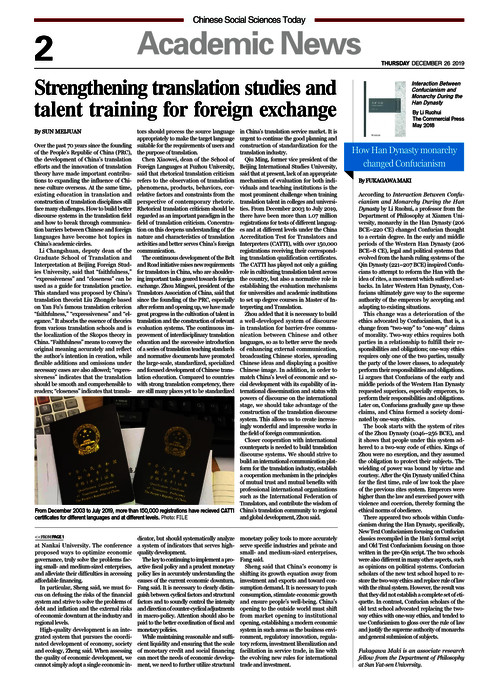Strengthening translation studies and talent training for foreign exchange
2019-12-26 09:36:30
From December 2003 to July 2019, more than 150,000 registrations have recieved CATTI certificates for different languages and at different levels. Photo: FILE
By SUN MEIJUAN
Over the past 70 years since the founding of the People’s Republic of China (PRC), the development of China’s translation efforts and the innovation of translation theory have made important contributions to expanding the influence of Chinese culture overseas. At the same time, existing education in translation and construction of translation disciplines still face many challenges. How to build better discourse systems in the translation field and how to break through communication barriers between Chinese and foreign languages have become hot topics in China’s academic circles.
Li Changshuan, deputy dean of the Graduate School of Translation and Interpretation at Beijing Foreign Studies University, said that “faithfulness,” “expressiveness” and “closeness” can be used as a guide for translation practice. This standard was proposed by China’s translation theorist Liu Zhongde based on Yan Fu’s famous translation criterion “faithfulness,” “expressiveness” and “elegance.” It absorbs the essence of theories from various translation schools and is the localization of the Skopos theory in China. “Faithfulness” means to convey the original meaning accurately and reflect the author’s intention in creation, while flexible additions and omissions under necessary cases are also allowed; “expressiveness” indicates that the translation should be smooth and comprehensible to readers; “closeness” indicates that translators should process the source language appropriately to make the target language suitable for the requirements of users and the purpose of translation.
Chen Xiaowei, dean of the School of Foreign Languages at Fuzhou University, said that rhetorical translation criticism refers to the observation of translation phenomena, products, behaviors, correlative factors and constraints from the perspective of contemporary rhetoric. Rhetorical translation criticism should be regarded as an important paradigm in the field of translation criticism. Concentration on this deepens understanding of the nature and characteristics of translation activities and better serves China’s foreign communication.
The continuous development of the Belt and Road initiative raises new requirements for translators in China, who are shouldering important tasks geared towards foreign exchange. Zhou Mingwei, president of the Translators Association of China, said that since the founding of the PRC, especially after reform and opening up, we have made great progress in the cultivation of talent in translation and the construction of relevant evaluation systems. The continuous improvement of interdisciplinary translation education and the successive introduction of a series of translation teaching standards and normative documents have promoted the large-scale, standardized, specialized and focused development of Chinese translation education. Compared to countries with strong translation competency, there are still many places yet to be standardized in China’s translation service market. It is urgent to continue the good planning and construction of standardization for the translation industry.
Qiu Ming, former vice president of the Beijing International Studies University, said that at present, lack of an appropriate mechanism of evaluation for both individuals and teaching institutions is the most prominent challenge when training translation talent in colleges and universities. From December 2003 to July 2019, there have been more than 1.07 million registrations for tests of different languages and at different levels under the China Accreditation Test for Translators and Interpreters (CATTI), with over 150,000 registrations receiving their corresponding translation qualification certificates. The CATTI has played not only a guiding role in cultivating translation talent across the country, but also a normative role in establishing the evaluation mechanisms for universities and academic institutions to set up degree courses in Master of Interpreting and Translation.
Zhou added that it is necessary to build a well-developed system of discourse in translation for barrier-free communication between Chinese and other languages, so as to better serve the needs of enhancing external communication, broadcasting Chinese stories, spreading Chinese ideas and displaying a positive Chinese image. In addition, in order to match China’s level of economic and social development with its capability of international dissemination and status with powers of discourse on the international stage, we should take advantage of the construction of the translation discourse system. This allows us to create increasingly wonderful and impressive works in the field of foreign communication.
Closer cooperation with international counterparts is needed to build translation discourse systems. We should strive to build an international communication platform for the translation industry, establish a cooperation mechanism in the principles of mutual trust and mutual benefits with professional international organizations such as the International Federation of Translators, and contribute the wisdom of China’s translation community to regional and global development, Zhou said.



